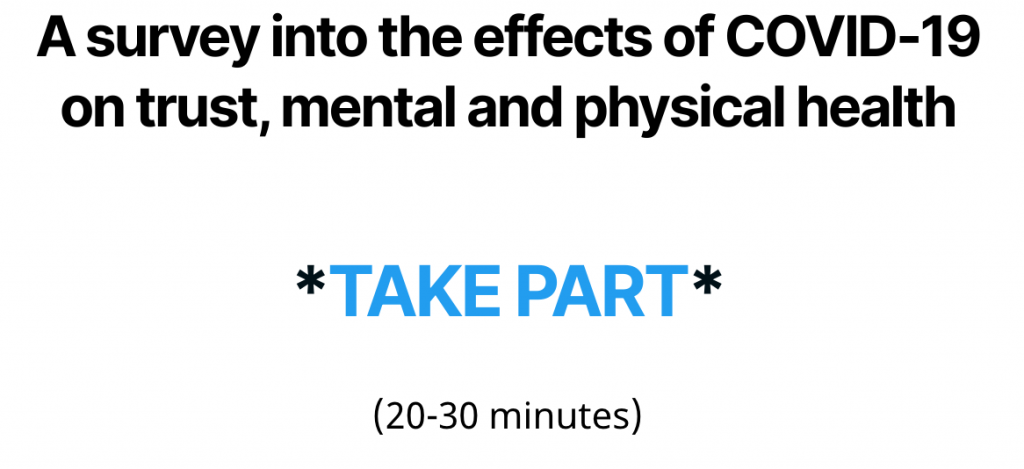 Hi Keri,
Hi Keri,
You are a Lecturer in Psychology at the Institute of Education (University College London), and you are the Principal investigator of the Global Covid-19 Study of Social Trust and Mental Health.
Can you tell us what drove you to create this study, and why it is necessary?
I had a few personal motivations to run this study. I am from Hong Kong and when I visited my family in December, I could see the early development of the Covid-19 crisis. As a teenager, I also lived through the 2003 SARS pandemic, which had a significant impact on my generation. I was old enough to remember the situation – I sat at my exams with a face mask. This experience with SARS gave me the impetus to start looking at how people are currently affected by the Covid-19 pandemic, especially in terms of mental health.
It started with a conversation with my collaborator at Penn, Professor Adrian Raine. It was early March, he was in London, before the UK lockdown. I had participated in a few COVID-19 surveys to see what other researchers were addressing. None of these (I believe) tackled social trust, which is my research area.
We’ve heard and seen people behave differently during the pandemic – I certainly behave differently too. In particular, I am interested in whether people may become less trusting of others, more suspicious about who has coronavirus or not, and feel more anxious given that the respect for lockdown guidelines vary across individuals. The virus is like an invisible enemy, circulating between people, and there is lots of uncertainty surrounding COVID-19. All of this, rightly so, can be very stressful! And individuals in a persistent state of stress are probably not operating at their best.
So I wanted to capture this right now, and to follow-up with people in 6 months and 12 months’ time, to see whether their experience has changed for the better (fingers crossed). Our survey is currently available in English, Chinese, French, German, Greek, Italian and Spanish.
I really want to understand what people are going through personally, because understanding people’s reactions, thoughts and emotions, can inform policies. The physical efficacy of public health guidelines (e.g. Which types of masks are efficient and when should we wear them?) has associated mental health concerns too (e.g. Does seeing other people wear face masks reduce or increase stress levels?). So it is important to adopt a multicultural approach to see how people’s experiences differ given that different countries have different policy responses to COVID-19.
Anyone 18+ years and resident of any country can take part as long as they can access the link www.GlobalCovidStudy.com (available in Chinese, Italian, Greek, French, German, Spanish). The survey takes most people 20 to 40 mins to complete. By taking part you are helping us understand the impact of COVID-19 on people’s health and how we can best support people moving forwards. So do contribute to the survey!
Do you have any other ongoing projects ?
Outside of this Covid-19 study, my research focuses on young people’s mental health. I currently have two projects.
In the first, I work with Dr. Marta Francesconi and Prof. Eirini Flouri on the ALSPAC study. We have a paper in preparation for submission looking at children’s and adolescents’ internalising (emotional) and externalising (behavioural) problems. In this paper we want to better understand when these emotional and behavioural problems best predict the occurrence of psychotic-like symptoms in adulthood. The findings from this paper can help identify windows for early interventions.
In the second, I work with the World bank to identify which behaviours promote effective teaching in developing countries. Most observational teaching tools (such as the Classroom Assessment Scoring System) are developed in Western countries, and what we might conceive as effective practices in these countries might not be the same elsewhere. It is therefore important to come up with comprehensive assessments that reflect the pedagogical and cultural reality in developing countries. The World Bank has developed the Teach observation tool with this purpose in mind.
This all looks very exciting Keri. A final word: How do you do to look after your mental health when you are researching other people’s mental health?
Well, I practice yoga! And I go for a walk or run every now and then – respecting social distancing, of course.
The Global Covid Study is open to anyone above 18 years of age.
The research team has also put together key resources about mental health, and publications on Covid-19.
Twitter: @DrKeriWong; @GlobalC19Study

